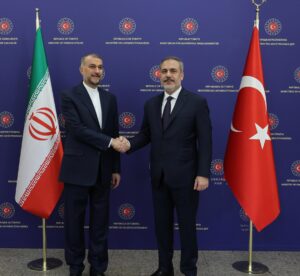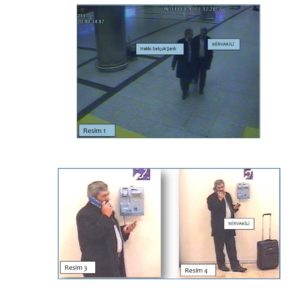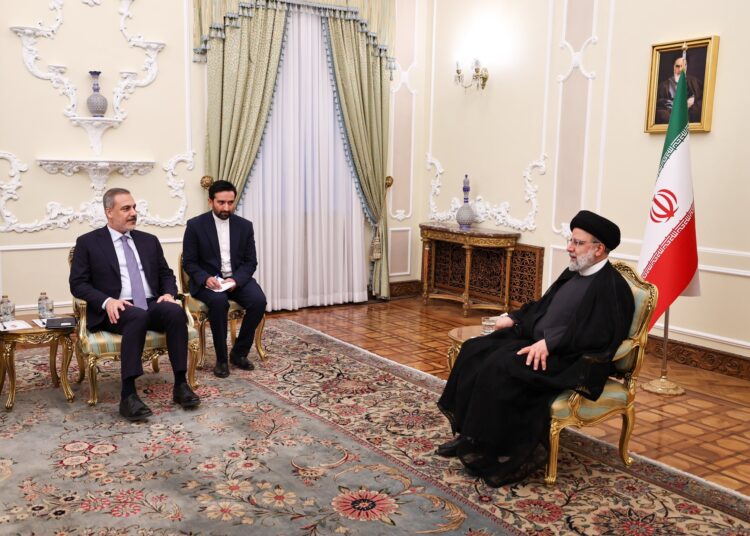Abdullah Bozkurt/Stockholm
The US federal case against an Iranian terror financier overseeing IRGC Quds Force activities in Turkey could pose significant problems for Turkish Foreign Minister Hakan Fidan, who has for a long time secretly facilitated the operative’s efforts to fund global terrorism.
Behnam Shahriyari, a Quds Force general known in Turkey as Sayed Ali Akber Mir Vakili, secretly met with Turkey’s foreign minister, who was then the head of Turkish intelligence agency MIT, in 2013. Despite being designated under US sanctions in July 2011 on terrorism-related charges, Shahriyari was freely operating in Turkey with the assistance of senior Turkish officials, devising schemes to fund the Quds Force’s global terrorist network.
Confidential documents obtained by Nordic Monitor revealed that Fidan was one of the key Turkish officials who aided and abetted the Quds Force’s illegal activities in Turkey and abroad. Under Fidan’s directives, Shahriyari was picked up at the airport by MIT agents, provided a security detail and escorted to meetings with senior Turkish government officials, including then-prime minister Recep Tayyip Erdogan and then-foreign minister Ahmet Davutoğlu.
This was not the first time Shahriyari had visited Turkey; he had traveled to the country multiple times, according to a Turkish investigation file. He coordinated illegal activities on behalf of the Quds Force and met with Turkish operatives who had previously been convicted and served time for terrorism-related crimes due to their links to the IRGC.
In 2011 Shahriyari was named a Specially Designated National (SDN) by the US Department of the Treasury’s Office of Foreign Assets Control (OFAC) under national security regulations related to global terrorism due to his involvement in an IRGC-linked shipping company that provided material support, including weapons, to Hezbollah on behalf of the IRGC.
Shahriyari, despite being a high-profile figure threatening the US, Turkey’s major NATO ally, and Turkey’s national security, had no difficulty interacting with the highest echelons of Turkish leadership, laundering Iranian state funds and facilitating the movement of IRGC oil through illicit schemes using Turkey’s corporate, financial and banking systems.
On February 2, 2024 he and six other accomplices, including Turkish national Sıtkı Ayan, a close associate of President Erdogan, were indicted by the US Attorney for the Southern District of New York on multiple charges, including terrorism, sanctions evasion, fraud and money laundering. The suspects were accused of laundering and selling Iranian oil to customers in China, Russia and Syria to finance the Quds Force.
US indictment of IRG Quds Force officials and their associates for a billion-dollar oil laundering network to finance terrorism:
The indictment was the outcome of a lengthy investigation conducted by multiple US government agencies. It was announced by Damian Williams, the US attorney for the Southern District of New York; Merrick B. Garland, the US attorney general; Lisa O. Monaco, the US deputy attorney general; Christopher A. Wray, the director of the Federal Bureau of Investigation (FBI); Matthew G. Olsen, the assistant attorney general for National Security; and James Smith, the assistant director in charge of the FBI’s New York field office.
The US indictment complements the Turkish investigation, which was disrupted in 2014 by the government of President Erdogan. Shahriyari emerged as a key suspect in a counterterrorism probe initiated by prosecutors in Istanbul on April 8, 2011, under case file 2011/762. As Turkish investigators began to map out Shahriyari’s connections in Turkey through wiretaps, surveillance and the examination of travel and banking records, they discovered his close association with Fidan.
The Turkish case file confirmed Shahriyari’s clandestine meeting with Fidan on October 23, 2013. In a wiretap dated October 21, 2013, at 21:35 hours, Fidan was recorded speaking with Faruk Koca, a Turkish national previously convicted on terrorism charges for his ties to an Iranian-backed terrorist group. Without explicitly mentioning Shahriyari’s name, Fidan inquired if Koca was hosting visitors from Iran. Koca mentioned Shahriyari’s imminent arrival and expressed a desire for a meeting with Erdogan. Fidan assured him that he would arrange it.
Two minutes later, Koca called Shahriyari to inform him that he was working on the arrangements for his visit and had told Fidan about the meeting. The next day at 21:32 hours, Koca and Fidan spoke again according to the wiretap records and discussed logistics and last-minute changes to the arrangements. Erdogan’s private meeting with the IRGC general was still not confirmed at that stage, despite the fact that Fidan had talked to the prime minister about Shahriyari’s upcoming visit. Fidan also told Koca that the intelligence agency would pick Shahriyari up at the airport.

The two also talked about getting assistance from Sefer Turan, Erdogan’s chief advisor on the Middle East and also a suspect in the investigation into the IRGC Turkish network. Fidan said Turan would make the arrangements for the meetings. In a wiretap dated October 23, 2013 at 18:12 hours, Turan called Koca to tell him he would also participate in Shahriyari’s meeting with Erdogan.
The wiretap records reveal that Shahriyari put a special emphasis on his meetings in Ankara. When he was unable to contact Koca immediately on the phone, he called his long-time asset Hakkı Selçuk Şanlı, a convicted felon who carried out bombings on behalf of the IRGC in the past, to ask him to locate Koca and have him return his call. As instructed Şanlı called Koca to tell him that his boss, Shahriyari, had been unable to reach him. Koca then called Shahriyari to reassure him that the meeting would go as planned.
On October 23, 2013 Shahriyari and his associates arrived in Turkey. Fidan made the arrangements for Shahriyari’s travels in-country and also provided a security detail to ensure he would not be under surveillance. They had no idea that the prosecutor’s confidential investigation was ongoing, and the police managed to photograph Shahriyari and his associates under surveillance.
Wiretap that recorded a phone conversation between Turkish intelligence chief Hakan Fidan and an Iranian asset named Faruk Koca:
The meeting with Erdogan took place on October 25, 2013 at the prime minister’s private residence in Ankara’s Keçiören district. The secret meeting was inadvertently revealed to the public by Erdogan himself in a speech he delivered in the eastern province of Van on October 26. Erdogan described Shahriyari as a “friend from Iran who came yesterday” without mentioning his name and said he and his friend talked about Muslims who had been killed in the Syrian civil war.
After his meeting with Erdogan, Shahriyari returned to Iran on a plane operated by the Turkish intelligence agency without the need to go through immigration and customs.
The IRGC Quds Force case in Turkey never went to trial because the Erdogan government squelched it in February 2014 after learning about the probe, which clearly incriminated senior government officials. The investigating prosecutor was sacked before he had a chance to secure detention warrants for the suspects or file an indictment.

Shahriyari, Ayan and their Turkish and Iranian associates managed to evade justice thanks to Erdogan’s intervention, apparently protecting pro-Iranian assets and assisting IRGC Quds Force handlers.
The US indictment reveals that Shahriyari continued to operate in Turkey after avoiding legal troubles, intensifying Iran’s illegal operations, particularly following the imposition of fresh US sanctions on Iran’s petroleum sector in 2018. He aided in constructing a complex network of shell companies in Turkey, Greece, the United Arab Emirates, India, Russia, Oman and other locations to facilitate the sale of oil, subsequently transferring billions of dollars back to Iran through various schemes, including bulk cash smuggling and fictitious trade deals.
The funds eventually ended up in the Quds Force network to finance terrorist operations and Iran-affiliated proxy groups such as Lebanon’s Hezbollah and Palestinian Hamas and Islamic Jihad.
Shahriyari was directly reporting to Quds Force Commander Rostam Ghasemi, who had previously served as Iran’s minister of oil and minister of transportation and urban development as well as the Iranian chair of the Iranian-Syrian Economic Relations Development Committee. Together they orchestrated a multibillion-dollar money laundering scheme to access funds subject to sanctions held at Turkish state lender Halkbank.
As the case progresses through the US federal court system, it may uncover additional evidence regarding the involvement and complicity of Turkish government officials in aiding and abetting Iran in the financing of global terrorism activities. This could pose a significant challenge for Turkey’s president and his foreign minister, who facilitated the operation of Shahriyari’s illicit network with impunity.
Summary of the police investigation into IRGC Quds Force general Shahriyari and his Turkish contacts including Foreign Minister Hakan Fidan:












